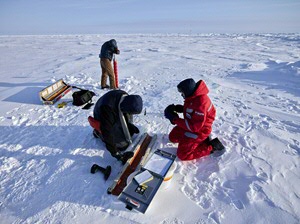Strong impact of melting sea ice on North Pole ecosystems

The melting sea ice around the North Pole will lead to drastic changes in the ecosystems of the polar area over the coming century. The growth of algae, crucial to local life systems, will be particularly affected. This expectation was announced in a new study conducted by 34 polar researchers, including marine biologists Dr Maria van Leeuwe and Dr Jacqueline Stefels from the University of Groningen. Their research has been published in academic journal Nature Climate Change.
According to Stefels, who spent four months on a research ship frozen into the ice in the North Pole at the beginning of 2020, the melting sea ice may cause changes in various aspects: ‘It has an incredibly strong impact on both biological, biogeochemical and physical processes. If the ice disappears, then this will have significant consequences.’ These consequences might well be positive, according to Stefels and her fellow researchers, but they are more likely to be negative.
Algae
Melting sea ice influences the growth of algae. As the ice becomes thinner or disappears, this allows much more sun to penetrate through the water below, increasing the growth of algae. For certain organisms that eat algae, such as zooplankton, this may be positive. Animals that then eat the zooplankton would also benefit from this. ‘But the increased algae growth may cause a shortage of certain nutrients and may limit biodiversity,’ explains Van Leeuwe.
Carbon dioxide
Another thing that the Groningen-based researchers expect might change as a result of increased algae growth is the absorption of greenhouse gas carbon dioxide (CO2) into the atmosphere surrounding the Arctic sea. It has been known for some time that algae form a sort of carpet under the ice that gradually sinks in large chunks to the seabed. In this process, the carbon dioxide trapped in the body mass of algae also disappears to the seabed. This can counteract climate change. On the other hand, there is a chance that the increased algae production will already be consumed by zooplankton in the upper layers. If this happens, the carbon dioxide trapped in the algae becomes released, promoting climate change.
Clouds
The research points to various possible consequences. Stefels is specifically looking at the production of dimethyl sulfide. This is a substance that is made by algae and emits sulphur naturally. This substance is important to the formation of clouds. Stefels: ‘It is therefore also key in countering climate change, as clouds block out sunlight and create a cooling effect.’ In Stefels’ opinion, the increased growth of algae may lead to more sulphur being released, but the premature melting of sea ice that causes this rise could also have a negative effect.
Stefels and her fellow researchers emphasize that further research is necessary due to these uncertainties. They also call for more long-term research in regions where sea ice is melting. In their eyes, this may be extremely useful for climate policy.
| Last modified: | 05 November 2020 1.46 p.m. |
More news
-
29 April 2024
Tactile sensors
Every two weeks, UG Makers puts the spotlight on a researcher who has created something tangible, ranging from homemade measuring equipment for academic research to small or larger products that can change our daily lives. That is how UG...
-
16 April 2024
UG signs Barcelona Declaration on Open Research Information
In a significant stride toward advancing responsible research assessment and open science, the University of Groningen has officially signed the Barcelona Declaration on Open Research Information.
-
02 April 2024
Flying on wood dust
Every two weeks, UG Makers puts the spotlight on a researcher who has created something tangible, ranging from homemade measuring equipment for academic research to small or larger products that can change our daily lives. That is how UG...
